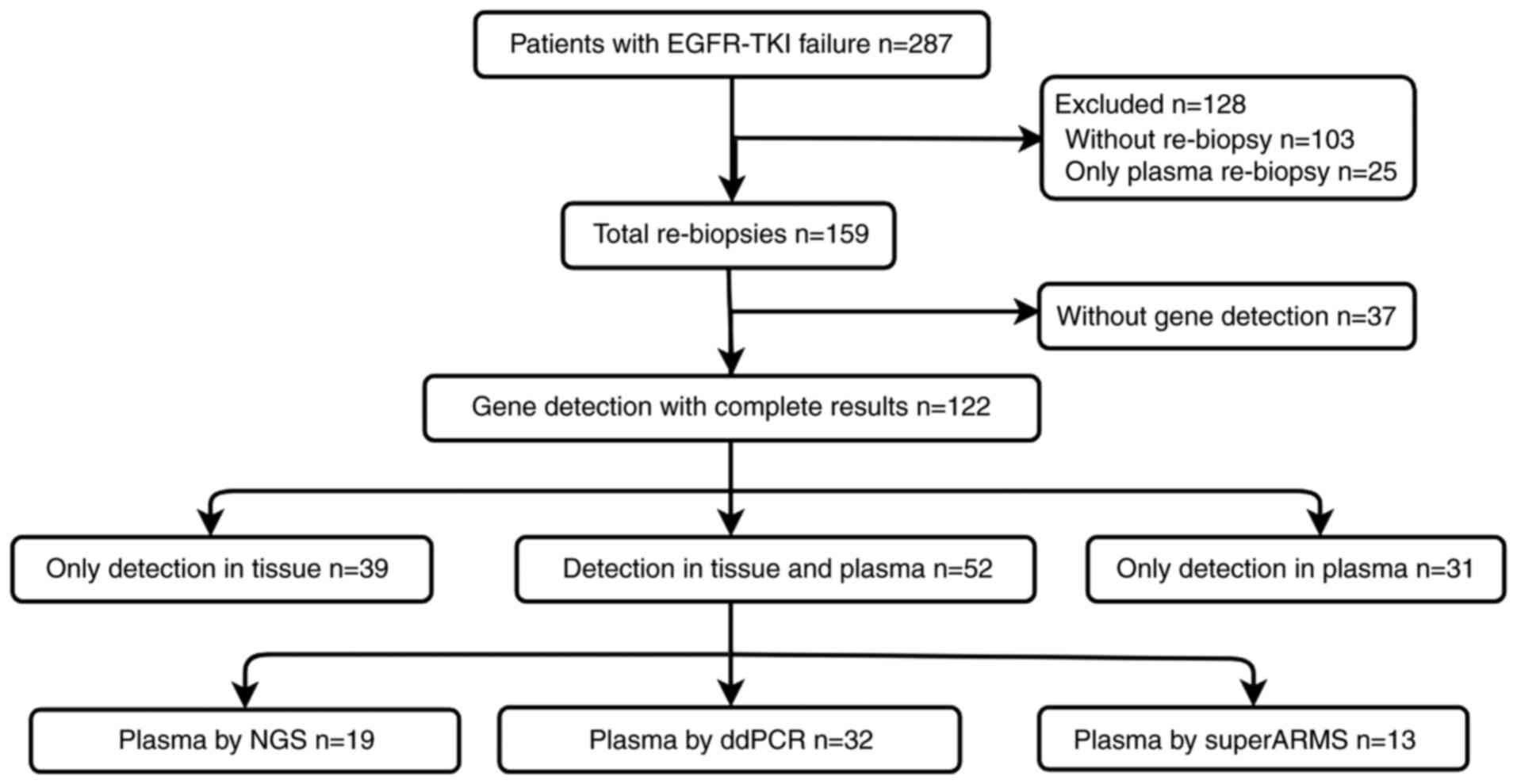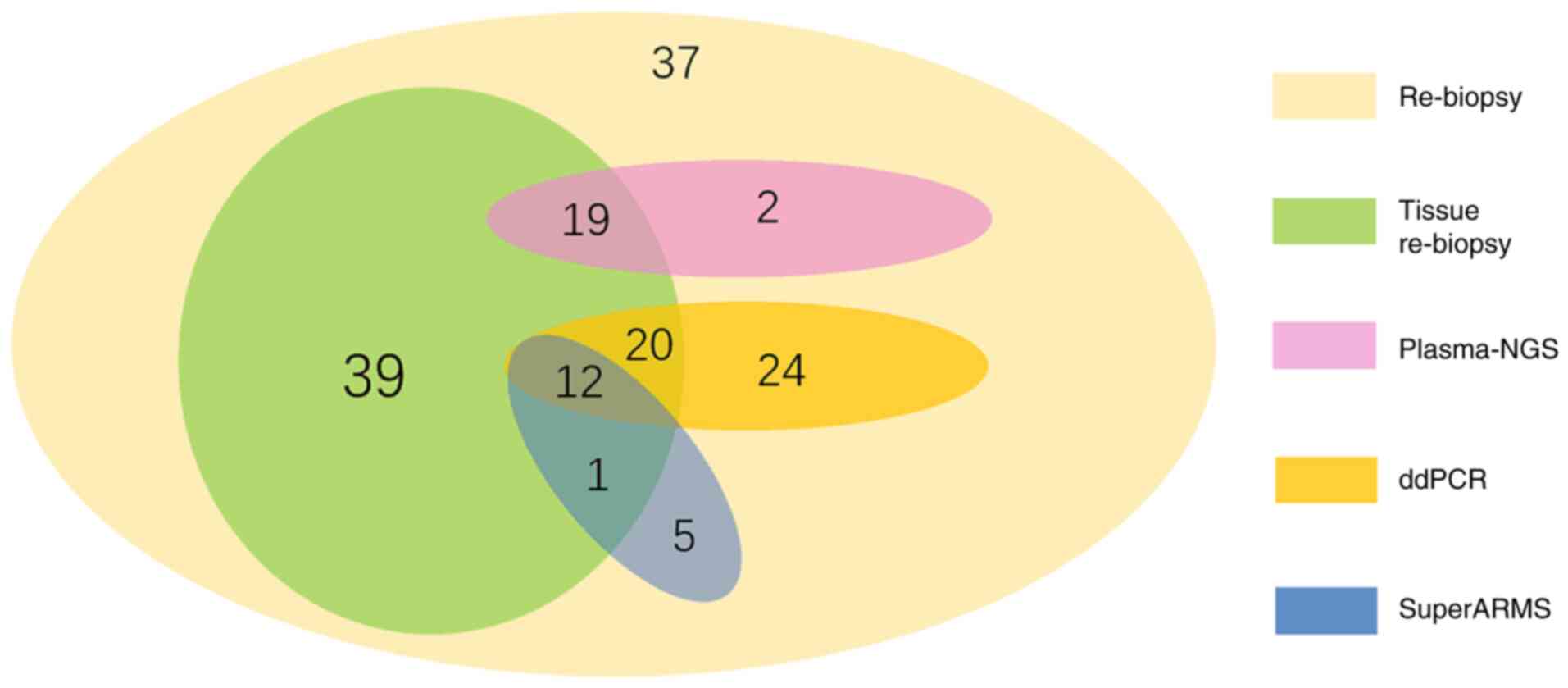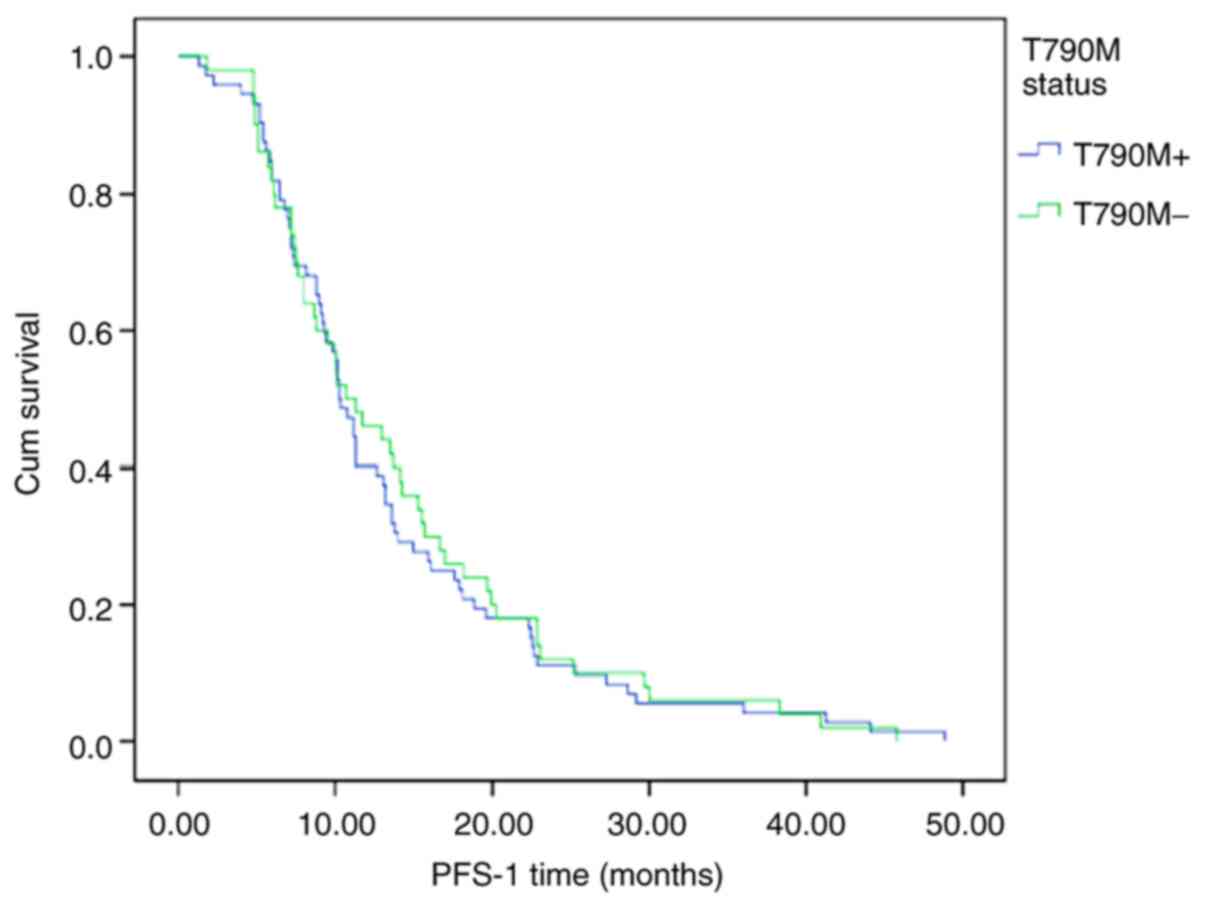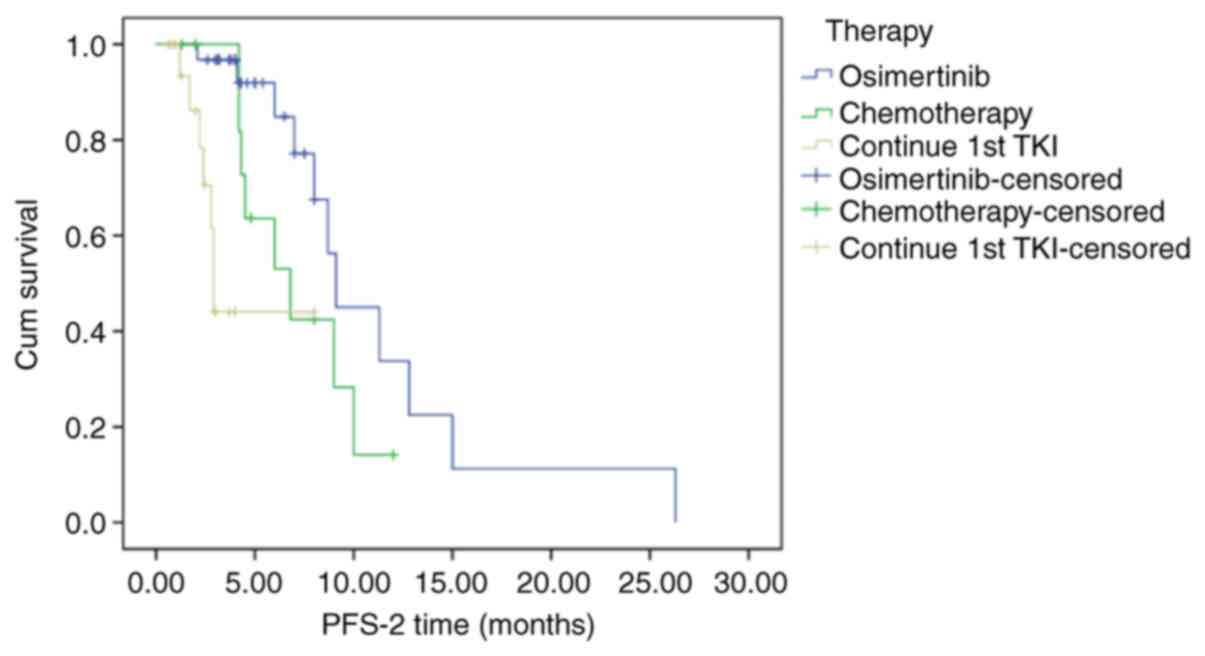|
1
|
Bray F, Ferlay J, Soerjomataram I, Siegel
RL, Torre LA and Jemal A: Global cancer statistics 2018: GLOBOCAN
estimates of incidence and mortality worldwide for 36 cancers in
185 countries. CA Cancer J Clin. 68:394–424. 2018.PubMed/NCBI View Article : Google Scholar
|
|
2
|
Wei WE, Mao NQ, Ning SF, Li JL, Liu HZ,
Xie T, Zhong JH, Feng Y, Wei CH and Zhang LT: An analysis of EGFR
mutations among 1506 cases of non-small cell lung cancer patients
in Guangxi, China. PLoS One. 11(e0168795)2016.PubMed/NCBI View Article : Google Scholar
|
|
3
|
Seo JS, Ju YS, Lee WC, Shin JY, Lee JK,
Bleazard T, Lee J, Jung YJ, Kim JO, Shin JY, et al: The
transcriptional landscape and mutational profile of lung
adenocarcinoma. Genome Res. 22:2109–2119. 2012.PubMed/NCBI View Article : Google Scholar
|
|
4
|
Mok TS, Wu YL, Thongprasert S, Yang CH,
Chu DT, Saijo N, Sunpaweravong P, Han B, Margono B, Ichinose Y, et
al: Gefitinib or carboplatin-paclitaxel in pulmonary
adenocarcinoma. N Engl J Med. 361:947–957. 2009.PubMed/NCBI View Article : Google Scholar
|
|
5
|
Rosell R, Carcereny E, Gervais R,
Vergnenegre A, Massuti B, Felip E, Palmero R, Garcia-Gomez R,
Pallares C, Sanchez JM, et al: Erlotinib versus standard
chemotherapy as first-line treatment for European patients with
advanced EGFR mutation-positive non-small-cell lung cancer
(EURTAC): A multicentre, open-label, randomised phase 3 trial.
Lancet Oncol. 13:239–246. 2012.PubMed/NCBI View Article : Google Scholar
|
|
6
|
Tan CS, Gilligan D and Pacey S: Treatment
approaches for EGFR-inhibitor-resistant patients with
non-small-cell lung cancer. Lancet Oncol. 16:e447–e459.
2015.PubMed/NCBI View Article : Google Scholar
|
|
7
|
Kobayashi S, Boggon TJ, Dayaram T, Jänne
PA, Kocher O, Meyerson M, Johnson BE, Eck MJ, Tenen DG and Halmos
B: EGFR mutation and resistance of non-small-cell lung cancer to
gefitinib. N Engl J Med. 356:786–792. 2005.PubMed/NCBI View Article : Google Scholar
|
|
8
|
Kosaka T, Yatabe Y, Endoh H, Yoshida K,
Hida T, Tsuboi M, Tada H, Kuwano H and Mitsudomi T: Analysis of
epidermal growth factor receptor gene mutation in patients with
non-small cell lung cancer and acquired resistance to gefitinib.
Clin Cancer Res. 12:5764–5770. 2006.PubMed/NCBI View Article : Google Scholar
|
|
9
|
Camidge DR, Pao W and Sequist LV: Acquired
resistance to TKIs in solid tumours: Learning from lung cancer. Nat
Rev Clin Oncol. 11:473–481. 2014.PubMed/NCBI View Article : Google Scholar
|
|
10
|
Sequist LV, Waltman BA, Dias-Santagata D,
Digumarthy S, Turke AB, Fidias P, Bergethon K, Shaw AT, Gettinger
S, Cosper AK, et al: Genotypic and histological evolution of lung
cancers acquiring resistance to EGFR inhibitors. Sci Transl Med.
3(75ra26)2011.PubMed/NCBI View Article : Google Scholar
|
|
11
|
Zhao J, Shao J, Zhao R, Li R, Yu K, Zhu L
and Zhang J: Histological evolution from primary lung
adenocarcinoma harboring EGFR mutation to high-grade neuroendocrine
carcinoma. Thorac Cancer. 9:129–135. 2018.PubMed/NCBI View Article : Google Scholar
|
|
12
|
Handorf EA, McElligott S, Vachani A,
Langer CJ, Demeter MB, Armstrong K and Asch DA: Cost effectiveness
of personalized therapy for first-line treatment of stage IV and
recurrent incurable adenocarcinoma of the lung. J Oncol Pract.
8:267–274. 2012.PubMed/NCBI View Article : Google Scholar
|
|
13
|
Kimura H, Kasahara K, Kawaishi M, Kunitoh
H, Tamura T, Holloway B and Nishio K: Detection of epidermal growth
factor receptor mutations in serum as a predictor of the response
to gefitinib in patients with non-small-cell lung cancer. Clin
Cancer Res. 12:3915–3921. 2006.PubMed/NCBI View Article : Google Scholar
|
|
14
|
Paweletz CP, Sacher AG, Raymond CK, Alden
RS, O'Connell A, Mach SL, Kuang Y, Gandhi L, Kirschmeier P, English
JM, et al: Bias-corrected targeted next-generation sequencing for
rapid, multiplexed detection of actionable alterations in cell-free
DNA from advanced lung cancer patients. Clin Cancer Res.
22:915–922. 2016.PubMed/NCBI View Article : Google Scholar
|
|
15
|
Feng WN, Gu WQ, Zhao N, Pan YM, Luo W,
Zhang H, Liang JM, Yang J and Deng YM: Comparison of the superARMS
and droplet digital PCR for detecting EGFR mutation in ctDNA from
NSCLC patients. Transl Oncol. 11:542–545. 2018.PubMed/NCBI View Article : Google Scholar
|
|
16
|
Li C, Jia R, Liu H, Zhang B and Wang C:
EGFR T790M detection and osimertinib treatment response evaluation
by liquid biopsy in lung adenocarcinoma patients with acquired
resistance to first generation EGFR tyrosine kinase inhibitors.
Diagn Pathol. 13(49)2018.PubMed/NCBI View Article : Google Scholar
|
|
17
|
Zhu G, Ye X, Dong Z, Lu YC, Sun Y, Liu Y,
McCormack R, Gu Y and Liu X: Highly sensitive droplet digital PCR
method for detection of EGFR-activating mutations in plasma
cell-free DNA from patients with advanced non-small cell lung
cancer. J Mol Diagn. 17:265–272. 2015.PubMed/NCBI View Article : Google Scholar
|
|
18
|
Vendrell JA, Mazieres J, Senal R,
Rouquette I, Quantin X, Pujol JL, Roch B, Bouidioua A, Godreuil S
and Coyaud E: Ultra-sensitive EGFR (T790M) detection as an
independent prognostic marker for lung cancer patients harboring
EGFR (del19) mutations and treated with first-generation TKIs. Clin
Cancer Res. 25:4280–4289. 2019.PubMed/NCBI View Article : Google Scholar
|
|
19
|
Mok TS, Wu YL, Ahn MJ, Garassino MC, Kim
HR, Ramalingam SS, Shepherd FA, He Y, Akamatsu H, Theelen WS, et
al: Osimertinib or platinum-pemetrexed in EGFR T790M-positive lung
cancer. N Engl J Med. 376:629–640. 2017.PubMed/NCBI View Article : Google Scholar
|
|
20
|
Seto T, Nogami N, Yamamoto N, Atagi S,
Tashiro N, Yoshimura Y, Yabuki Y and Saka H: Real-World EGFR T790M
Testing in advanced nonsmall-cell lung cancer: A prospective
observational study in Japan. Oncol Ther. 6:203–215.
2018.PubMed/NCBI View Article : Google Scholar
|
|
21
|
Jackman D, Pao W, Riely GJ, Engelman JA,
Kris MG, Janne PA, Lynch T, Johnson BE and Miller VA: Clinical
definition of acquired resistance to epidermal growth factor
receptor tyrosine kinase inhibitors in non-small-cell lung cancer.
J Clin Oncol. 28:357–360. 2010.PubMed/NCBI View Article : Google Scholar
|
|
22
|
Eisenhauer EA, Therasse P, Bogaerts J,
Schwartz LH, Sargent D, Ford R, Dancey J, Arbuck S, Gwyther S,
Mooney M, et al: New response evaluation criteria in solid tumours:
Revised RECIST guideline (version 1.1). Eur J Cancer. 45:228–247.
2009.PubMed/NCBI View Article : Google Scholar
|
|
23
|
Lindeman NI, Cagle PT, Aisner DL, Arcila
ME, Beasley MB, Bernicker EH, Colasacco C, Dacic S, Hirsch FR, Kerr
K, et al: Updated molecular testing guideline for the selection of
lung cancer patients for treatment with targeted tyrosine kinase
inhibitors: Guideline from the college of American pathologists,
the international association for the study of lung cancer, and the
association for molecular pathology. Arch Pathol Lab Med.
142:321–346. 2018.PubMed/NCBI View Article : Google Scholar
|
|
24
|
Wei Z, Shah N, Deng C, Xiao X, Zhong T and
Li X: Circulating DNA addresses cancer monitoring in non small cell
lung cancer patients for detection and capturing the dynamic
changes of the disease. Springerplus. 26(531)2016.PubMed/NCBI View Article : Google Scholar
|
|
25
|
Diehl F, Schmidt K, Choti MA, Romans K,
Goodman S, Li M, Thornton K, Agrawal N, Sokoll L, Szabo SA, et al:
Circulating mutant DNA to assess tumor dynamics. Nat Med.
14:985–990. 2008.PubMed/NCBI View
Article : Google Scholar
|
|
26
|
Dawson SJ, Tsui DW, Murtaza M, Biggs H,
Rueda OM, Chin SF, Dunning MJ, Gale D, Forshew T, Mahler-Araujo B,
et al: Analysis of circulating tumor DNA to monitor metastatic
breast cancer. N Engl J Med. 368:1199–1209. 2013.PubMed/NCBI View Article : Google Scholar
|
|
27
|
Haber DA and Velculescu VE: Blood-based
analyses of cancer: Circulating tumor cells and circulating tumor
DNA. Cancer Discov. 4:650–661. 2014.PubMed/NCBI View Article : Google Scholar
|
|
28
|
Usui K, Yokoyama T, Naka G, Ishida H,
Kishi K, Uemura K, Ohashi Y and Kunitoh H: Plasma ctDNA monitoring
during epidermal growth factor receptor (EGFR)-tyrosine kinase
inhibitor treatment in patients with EGFR-mutant non-small cell
lung cancer (JP-CLEAR trial). Jpn J Clin Oncol. 1:554–558.
2019.PubMed/NCBI View Article : Google Scholar
|
|
29
|
Zugazagoitia J, Gomez-Rueda A,
Jantus-Lewintre E, Isla D, Camps C, Ramos I, Trigo JM, Bernabé R,
Juan-Vidal O, Sanchez-Torres JM, et al: Clinical utility of
plasma-based digital next-generation sequencing in oncogene-driven
non-small-cell lung cancer patients with tyrosine kinase inhibitor
resistance. Lung Cancer. 134:72–78. 2019.PubMed/NCBI View Article : Google Scholar
|
|
30
|
Cui S, Ye L, Wang H, Chu T, Zhao Y, Gu A,
Xiong L, Shi C and Jiang L: Use of superARMS EGFR mutation
detection kit to detect EGFR in plasma cell-free DNA of patients
with lung adenocarcinoma. Clin Lung Cancer. 19:e313–e122.
2018.PubMed/NCBI View Article : Google Scholar
|
|
31
|
Siravegna G, Marsoni S, Siena S and
Bardelli A: Integrating liquid biopsies into the management of
cancer. Nat Rev Clin Oncol. 14:531–548. 2017.PubMed/NCBI View Article : Google Scholar
|
|
32
|
Diaz LA Jr and Bardelli A: Liquid
biopsies: Genotyping circulating tumor DNA. J Clin Oncol.
32:579–586. 2014.PubMed/NCBI View Article : Google Scholar
|
|
33
|
Nosaki K, Satouchi M, Kurata T, Yoshida T,
Okamoto I, Katakami N, Imamura F, Tanaka K, Yamane Y, Yamamoto N,
et al: Re-biopsy status among non-small cell lung cancer patients
in Japan: A retrospective study. Lung Cancer. 101:1–8.
2016.PubMed/NCBI View Article : Google Scholar
|
|
34
|
Arcila ME, Oxnard GR, Nafa K, Riely GJ,
Solomon SB, Zakowski MF, Kris MG, Pao W, Miller VA and Ladanyi M:
Rebiopsy of lung cancer patients with acquired resistance to EGFR
inhibitors and enhanced detection of the T790M mutation using a
locked nucleic acid-based assay. Clin Cancer Res. 17:1169–1180.
2011.PubMed/NCBI View Article : Google Scholar
|
|
35
|
Li Y, Xu Y, Wu X, He C, Liu Q and Wang F:
Comprehensive analysis of EGFR T790M detection by ddPCR and
ARMS-PCR and the effect of mutant abundance on the efficacy of
osimertinib in NSCLC patients. J Thorac Dis. 11:3004–3014.
2019.PubMed/NCBI View Article : Google Scholar
|
|
36
|
Oxnard GR, Thress KS, Alden RS, Lawrance
R, Paweletz CP, Cantarini M, Yang JCH, Barrett JC and Jänne PA:
Association between plasma genotyping and outcomes of treatment
with osimertinib (AZD9291) in advanced non-small-cell lung cancer.
J Clin Oncol. 34:3375–3382. 2016.PubMed/NCBI View Article : Google Scholar
|
|
37
|
Sakai K, Horiike A, Irwin DL, Kudo K,
Fujita Y, Tanimoto A, Sakatani T, Saito R, Kaburaki K, Yanagitani
N, et al: Detection of epidermal growth factor receptor T790M
mutation in plasma DNA from patients refractory to epidermal growth
factor receptor tyrosine kinase inhibitor. Cancer Sci.
104:1198–1204. 2013.PubMed/NCBI View Article : Google Scholar
|
|
38
|
Wang Z, Chen R, Wang S, Zhong J, Wu M,
Zhao J, Duan J, Zhuo M, An T, Wang Y, et al: Quantification and
dynamic monitoring of EGFR T790M in plasma cell-free DNA by digital
PCR for prognosis of EGFR-TKI treatment in advanced NSCLC. PLoS
One. 9(e110780)2014.PubMed/NCBI View Article : Google Scholar
|
|
39
|
Wu YL, Cheng Y, Zhou X, Lee KH, Nakagawa
K, Niho S, Tsuji F, Linke R, Rosell R, Corral J, et al: Dacomitinib
versus gefitinib as first-line treatment for patients with
EGFR-mutation-positive non-small-cell lung cancer (ARCHER 1050): A
randomised, open-label, phase 3 trial. Lancet Oncol. 18:1454–1466.
2017.PubMed/NCBI View Article : Google Scholar
|
|
40
|
Kuo CS, Huang CH, Liu CY, Pavlidis S, Ko
HW, Chung FT, Lin TY, Wang CL, Guo YK and Yang CT: Prior EGFR-TKI
treatment in EGFR-mutated NSCLC affects the allele frequency
fraction of acquired T790M and the subsequent efficacy of
osimertinib. Target Oncol. 14:433–440. 2019.PubMed/NCBI View Article : Google Scholar
|
|
41
|
Soria JC, Ohe Y, Vansteenkiste J,
Reungwetwattana T, Chewaskulyong B, Lee KH, Dechaphunkul A, Imamura
F, Nogami N, Kurata T, et al: Osimertinib in untreated EGFR-mutated
advanced non-small-cell lung cancer. N Engl J Med. 378:113–125.
2018.PubMed/NCBI View Article : Google Scholar
|
|
42
|
Wang BX, Ou W, Mao XY, Liu Z, Wu HQ and
Wang SY: Impacts of EGFR mutation and EGFR-TKIs on incidence of
brain metastases in advanced non-squamous NSCLC. Clin Neurol
Neurosurg. 160:96–100. 2017.PubMed/NCBI View Article : Google Scholar
|
|
43
|
Heon S, Yeap BY, Lindeman NI, Joshi VA,
Butaney M, Britt GJ, Costa DB, Rabin MS, Jackman DM and Johnso BW:
The impact of initial gefitinib or erlotinib versus chemotherapy on
central nervous system progression in advanced non-small cell lung
cancer with EGFR mutations. Clin Cancer Res. 18:4406–4414.
2012.PubMed/NCBI View Article : Google Scholar
|
|
44
|
Porta R, Sanchez-Torres JM, Paz-Ares L,
Massuti B, Reguart N, Mayo C, Lianes P, Queralt C, Guillem V,
Salinas P, et al: Brain metastases from lung cancer responding to
erlotinib: The importance of EGFR mutation. Eur Respir J.
37:624–631. 2011.PubMed/NCBI View Article : Google Scholar
|
|
45
|
Niederst MJ, Sequist L, Poirier JT, Mermel
CH, Lockerman EL, Garcia AR, Katayama R, Costa C, Ross KN, Moran T,
et al: RB loss in resistant EGFR mutant lung adenocarcinomas that
transform to small-cell lung cancer. Nat Commun.
11(6377)2015.PubMed/NCBI View Article : Google Scholar
|
|
46
|
Shiroyama T, Nasu S, Tanaka A, Takata S,
Masuhiro K, Takada H, Morita S, Morishita N, Suzuki H, Okamoto N,
et al: Transformation to small cell lung cancer after first-line
afatinib treatment. Respir Med Case Rep. 23:188–190.
2018.PubMed/NCBI View Article : Google Scholar
|


















